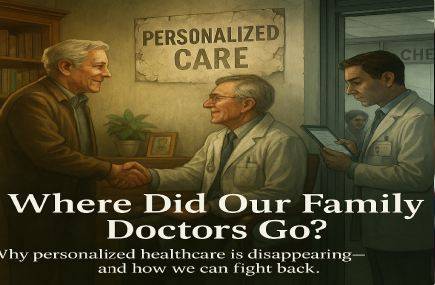The Disappearance of the Family Doctor
For decades now, the trustworthy family doctor was the backbone of personalized healthcare, with such doctors providing continuous care to multiple generations and knowing their patients’ medical histories as well as their personal circumstances. Today, however, that model is receding. Patients are being herded into corporate-run medical networks that prioritize efficiency and productivity over personal relationships. “The easily accessible neighborhood family doctor is extinct,” laments Martin S. Finkelstein, MD.
Economic pressures, in combination with the consolidation of medical practices and the rise of corporate healthcare systems, are driving this extinction. Independent doctors cannot compete with hospital-operated offices due to constricting regulations imposed by insurance providers. As a result, these independent doctors are selling their practices and retiring; this reduces the possibility of choosing personal care for the patients.
Why This Change Matters
The loss of family doctors has had serious consequences for patients. Family doctors were historically responsible for overseeing the bodily as well as mental health of their patients. They treated chronic health conditions and preventive disorders while being aware of the medical history of the family. Nowadays, the transformation of the healthcare environment requires patients to diverge into systems with fragmented specialties; thus, they are shuffled from one specialist to another. While specialists are knowledgeable about their respective fields, they may not have a complete picture of a given patient’s health. According to Finkelstein, “The doctor whom the patients have historically entrusted with guarding their body, psyche, and health… is gone.”
The Consequences of Losing Family Doctors
- Lack of Continuity of Care
- Different health providers pay visits at appointment time and it becomes impossible to develop long-term continuity in doctor- patient relationship.
- The doctor himself is less acquainted with the patient’s history which often leads to misdiagnosis or having the same tests run as procedures done on the patient.
- Preventive Care
- Family practitioners, once part of the health care system, knew that their patients would take the focus away from preventive medicine in favor of their overall health and realizing the early symptoms of potentially serious illness.
- Every patient requires preventive care but soon it will turn into other illnesses if they cannot prevent them from turning to some form of severe injury.
- Higher Dependency on Urgent Care and ER Visits
- A lot of patients who lack a permanent family physician are compelled to rely on urgent care or ER visits for conditions perceived as routine.
- This really makes the expenditure highly costly, and care becomes very fragmented.
- Gradual erosion of the doctor-patient relationship
- Doctors found in hospitals of corporate setting are often given a tight rope where they have to see more patients in less time, leaving little time for meaningful interaction.
- Patients feel that whatever they become has just been within the number given when talking about systems that prioritized efficiency over personalized care.
How to Find Personalized Healthcare
In spite of the fact that medicine is becoming increasingly corporatized, patients still have avenues for regaining a personal touch to their healthcare. Although it may mean more grunt work and advocacy, there exist many ways of rebuilding strong doctor-patient relations, as well as full-fledged medical attention.
1. Seek Concierge or Direct Primary Care
Concierge medicine and direct primary care (DPC) serve as an alternative to insurance-based healthcare delivery. In this model, patients make a monthly or yearly payment to have direct access to their physician. This permits the physician to see fewer patients and thus provide more personalized care.
Pros:
- Time spent in the office is longer.
- Direct communication with the doctor via phone or virtual consultations
- Preventive care is stressed rather than reactive treatment.
Cons:
- Monthly fees may be difficult for some to afford.
- Insurance typically does not reimburse.
2. Advocate for Policy Change
Systemic problems in healthcare policy have greatly contributed to the decline of the family doctor. Now you are empowered as a patient to advocate for the necessary reforms to protect independent physicians who can place patient-centered care first.
Ways to Get Involved:
- Support legislation that promotes family medicine and general participation.
- Advocate for fair insurance reimbursement policies for primary care physicians.
- Participate in the patient advocacy for healthcare models emphasizing relationships over efficiency.
3. Develop Stronger Doctor-Patient Relationships
Even under the present set of conditions, it affords patients avenues for building strong relationships with healthcare providers.
Some Strategies to Strengthen This Relationship:
- Locate a doctor willing to engage with patients. Research and identify doctors who listen and talk about concerns affecting general health.
- Have an annual wellness visit. You may not always catch your doctor in the office, but regular wellness visits ensure patients are being taken care of when it comes to continuity.
- A little more inquisitive and proactive. As clarification when wondering about treatments and medications or plans for health, just ask.
- A very clear record of medical history. If everything is recorded about your medical history, every provider you see knows the full story.
The Future of Personalized Healthcare
The dispensability of a primary family doctor is not an irreversible reality. The patient can ask for conversion of the model from profit-centric to relationship-centric healthcare.
Individuals must engage themselves in their healthcare-the same way they are going to look for direct primary care, bring about changes in the system, or develop more profound relationships with their existing providers. They would even bewail against the corporate style in medicine.
Raising awareness and taking activism is the way to reverse this trend. Thus, patients may continue to experience that personalized healthcare will never be an obsolete scenario through informed choices and activism for reforms.
To find out more about the consequences of corporatization in healthcare, visit Corporatized, Managed Healthcare: Your Health – Your Choices – Your Distress – My Dismay by Martin S. Finkelstein, MD: Amazon Link.

